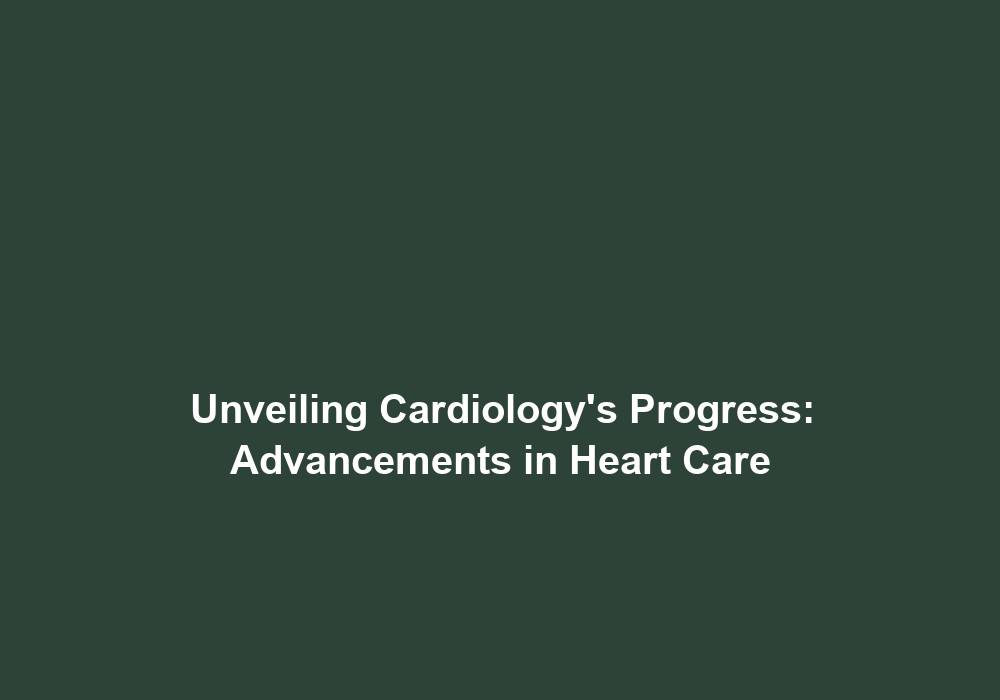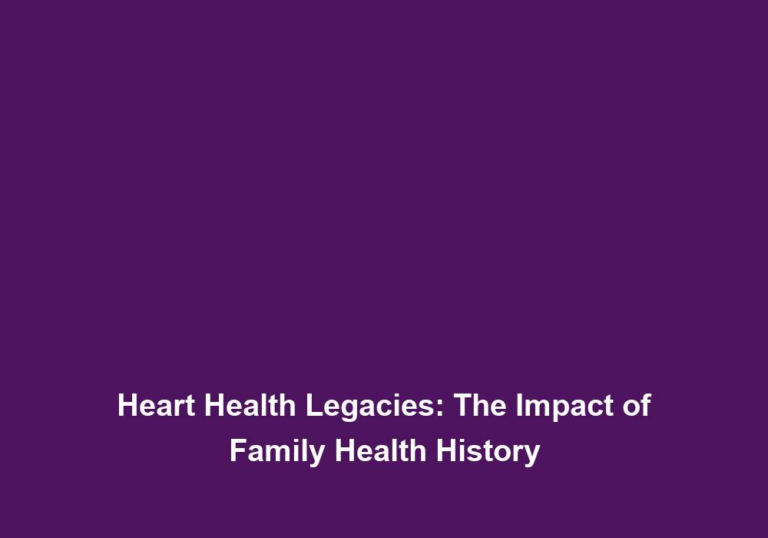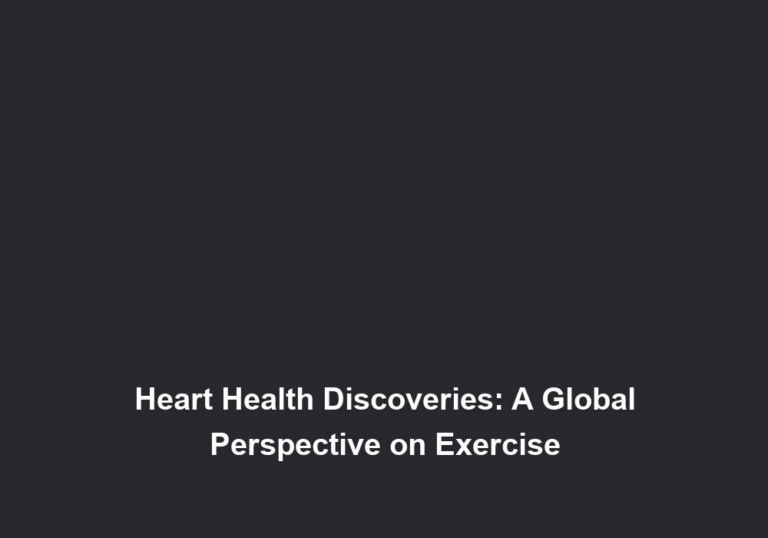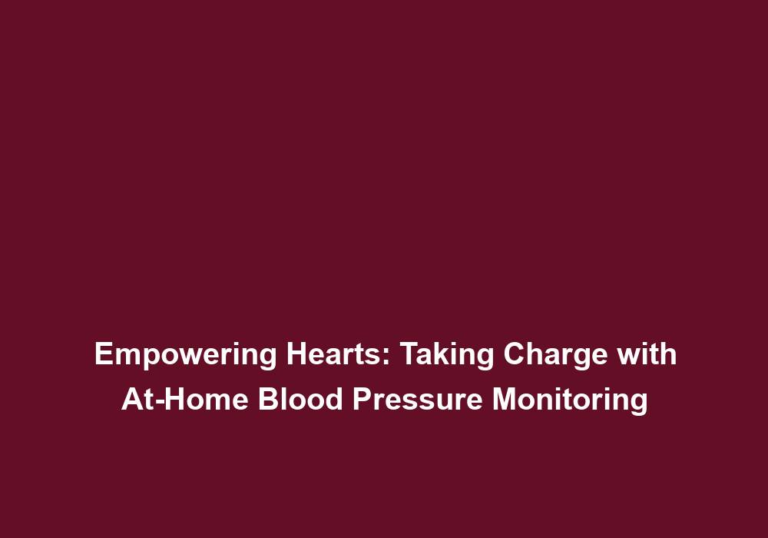Unveiling Cardiology’s Progress: Advancements in Heart Care
The field of cardiology has witnessed remarkable progress and advancements in recent years, revolutionizing the way we approach heart care. With continuous research, technological innovations, and improved understanding of cardiovascular diseases, medical professionals are now equipped with a vast array of tools and techniques to diagnose, treat, and prevent heart conditions. In this article, we will explore some of the noteworthy advancements that have transformed cardiology, leading to improved outcomes and enhanced patient care.
1. Diagnostic Innovations
Early and accurate diagnosis is crucial in managing and treating heart conditions effectively. Fortunately, numerous diagnostic innovations have emerged, enabling healthcare providers to identify cardiovascular diseases with greater precision. Some of these advancements include:
a) Non-Invasive Imaging Techniques
Advanced imaging technologies like echocardiography, cardiac MRI, and computed tomography (CT) scans have revolutionized cardiology. These non-invasive procedures allow physicians to visualize the heart and its structures, providing detailed information about its functioning, blood flow, and potential abnormalities. By obtaining high-resolution images, doctors can diagnose conditions such as coronary artery disease, heart valve disorders, and congenital heart defects, among others.
Some key benefits of non-invasive imaging techniques include:
- Safe and painless procedures for patients
- Detailed visualization of the heart’s anatomy and function
- Early detection of structural abnormalities or blockages
- Accurate assessment of blood flow and cardiac performance
- Monitoring the effectiveness of treatment interventions
b) Biomarkers for Early Detection
Biomarkers play a crucial role in diagnosing and monitoring heart diseases. Over the years, researchers have identified several biomarkers that can indicate the presence of cardiac conditions. For instance, troponin levels in the blood can indicate damage to the heart muscle, while brain natriuretic peptide (BNP) levels can be used to evaluate heart failure. These biomarkers enable healthcare professionals to detect heart problems early, facilitating timely intervention and treatment.
The use of biomarkers in cardiology offers the following advantages:
- Early detection of cardiac diseases before symptoms manifest
- Monitoring disease progression and treatment response
- Identification of high-risk individuals for preventive interventions
- Assessment of prognosis and risk stratification
- Personalized treatment plans based on individual biomarker profiles
2. Interventional Cardiology
Interventional cardiology has revolutionized the way we manage cardiovascular diseases, offering minimally invasive procedures that often eliminate the need for open-heart surgery. These procedures are not only less invasive but also significantly reduce recovery time for patients. Some key advancements in interventional cardiology include:
a) Coronary Angioplasty and Stenting
Coronary angioplasty, also known as percutaneous coronary intervention (PCI), is a widely used procedure to treat coronary artery disease. During this procedure, a catheter with a deflated balloon is inserted into the narrowed or blocked coronary artery. The balloon is then inflated, compressing the plaque and widening the artery to restore blood flow. In some cases, a stent (a small mesh tube) may be inserted to keep the artery open, reducing the chances of re-narrowing.
Advantages of coronary angioplasty and stenting:
- Minimally invasive approach compared to traditional open-heart surgery
- Rapid relief of symptoms and restoration of blood flow
- Shorter hospital stays and faster recovery times
- Lower risk of complications and infections
- Improved quality of life for patients with coronary artery disease
b) Transcatheter Aortic Valve Replacement (TAVR)
TAVR is a groundbreaking procedure used to replace a malfunctioning aortic valve without open-heart surgery. It involves inserting a collapsible valve through a catheter and positioning it within the native valve. Once in place, the new valve expands, pushing aside the faulty valve and restoring proper blood flow. TAVR offers a less invasive alternative to traditional surgical valve replacement, particularly for high-risk or elderly patients.
Benefits of Transcatheter Aortic Valve Replacement:
- Avoidance of open-heart surgery and associated risks
- Shorter recovery time and reduced hospital stays
- Improved quality of life for patients with aortic valve disease
- Less trauma to the body compared to traditional valve replacement
- Suitable for individuals who are not eligible for surgery due to age or health conditions
3. Personalized Medicine and Precision Treatment
The advent of personalized medicine has significantly transformed the field of cardiology. With advancements in genetics, genomics, and bioinformatics, it is now possible to tailor treatments to an individual’s unique genetic makeup, lifestyle, and specific risk factors. This approach helps optimize treatment outcomes and reduce the risk of adverse effects.
a) Genetic Testing and Risk Assessment
Genetic testing allows doctors to identify specific gene mutations or variations associated with cardiovascular diseases. By analyzing an individual’s genetic profile, healthcare providers can assess the risk of developing certain conditions and design personalized prevention strategies. This information assists in early detection, intervention, and the selection of appropriate treatment options.
Benefits of genetic testing in cardiology:
- Early identification of genetic predispositions to heart diseases
- Tailored prevention strategies based on individual risk profiles
- More effective screening programs for high-risk individuals
- Improved decision-making regarding treatment options
- Enhanced patient engagement and empowerment through personalized care
b) Pharmacogenomics
Pharmacogenomics, a branch of personalized medicine, focuses on how an individual’s genetic makeup influences their response to medications. This field helps identify which drugs are most effective for a patient based on their genetic profile, minimizing the risk of adverse reactions and optimizing treatment outcomes. Tailoring medication regimens to an individual’s genetic characteristics enhances the overall effectiveness of heart care.
Advantages of pharmacogenomics in cardiology:
- More precise selection of medications based on genetic compatibility
- Reduced risk of adverse drug reactions and side effects
- Personalized dosing regimens for optimal therapeutic response
- Improved medication adherence and patient satisfaction
- Better treatment outcomes and long-term management of heart conditions
4. Telemedicine and Remote Monitoring
The emergence of telemedicine and remote monitoring technologies has revolutionized patient care, particularly for individuals with cardiovascular diseases. These advancements allow healthcare professionals to monitor patients’ heart health remotely, providing timely interventions and reducing the need for frequent hospital visits. Here are some key aspects of remote heart care:
a) Remote ECG Monitoring
Remote ECG monitoring devices enable patients to record and transmit their electrocardiogram (ECG) data to healthcare providers without leaving their homes. This technology allows doctors to detect abnormal heart rhythms, assess the effectiveness of medications, and provide necessary adjustments to the treatment plan. Remote ECG monitoring improves access to care and enhances patient convenience, especially for those living in remote areas.
Benefits of remote ECG monitoring:
- Continuous monitoring of heart health without the need for hospital visits
- Early detection of arrhythmias and other cardiac abnormalities
- Prompt adjustments to medication regimens for optimal control
- Improved patient compliance and engagement in self-care
- Timely interventions to prevent complications and hospitalizations
b) Virtual Consultations
Telemedicine facilitates virtual consultations, allowing patients to communicate with cardiologists and other healthcare professionals remotely. This technology enables physicians to review patient symptoms, discuss test results, and provide guidance on managing heart conditions. Virtual consultations save time, reduce travel costs, and ensure uninterrupted access to expert advice, particularly during emergencies or situations where in-person visits may be challenging.
Advantages of virtual consultations in cardiology:
- Convenient access to specialized care regardless of geographical location
- Reduced travel time and associated expenses for patients and caregivers
- Prompt evaluation and management of cardiac symptoms or concerns
- Seamless continuation of care during public health emergencies or natural disasters
- Enhanced patient-provider communication and shared decision-making
In conclusion, the progress made in cardiology has significantly transformed the field of heart care. Diagnostic innovations, interventional cardiology procedures, personalized medicine, and remote monitoring technologies have revolutionized the way cardiovascular diseases are diagnosed, treated, and managed. These advancements have not only improved patient outcomes but also enhanced the overall experience of individuals battling heart conditions. As technology continues to evolve, we can anticipate further breakthroughs that will shape the future of cardiology and bring us closer to conquering heart diseases.







